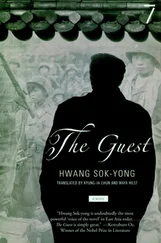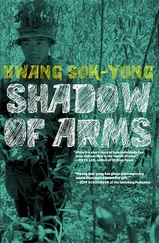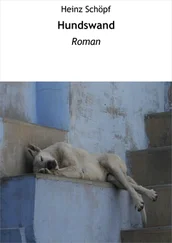“Rice!” Father exclaimed in wonder, digging his spoon into the heaping metal bowl.
“We get to eat rice everyday here,” I bragged.
Grandmother, Hyun and I were surprised by what he did next. Without any word or gesture to us to go ahead and start eating, he picked up the pot of soup that we were all supposed to eat from, poured over half of it onto his own rice and started shovelling the food into his mouth. He had his face down close to the bowl. We could see the top of his head: the hair had fallen out, leaving sparse clumps, and the grey had turned nearly all white. Grandmother turned to us as we sat and stared at him, our spoons motionless in our hands.
“You two, go on now. Let’s eat.”
I could tell that Father had changed. He’d never been much of a talker, but Grandmother murmured to us later, with damp eyes, that his experiences in the labour camp had changed him. He slept like the dead. Night and day, he lay curled up in the innermost corner of the shed, sleeping until the next mealtime, when he would slowly rise, eat some more and fall back to sleep. After about two weeks of this, he finally seemed to come to. He started hanging around outside the shed, and would go out to the orchard in search of firewood to help Grandmother with the cooking. Once we went with him across the main road to the edge of the forest, where we could see the Tumen River. He stared for a long time at the mountains stripped bare on the other side and at the houses clustered along the edges of the fields like grey mushrooms.
“Sons of bitches!”
With that, he turned and stalked back to the orchard. We lingered there a moment longer, studying the North Korean side of the river visible through the tree branches. There was no sign of anyone in the fields or along the foot of the mountains. To whom had his curses been aimed?
Toward the end of the year, when the ice was frozen solid and the distant mountains were covered in snow, Chilsung began barking more and more at night. Whether because of their daughter’s badgering or because of the animals that sometimes came down from the hills, the farmer’s wife had asked Grandmother to let them keep Chilsung in their front yard, in a doghouse they built from some cement blocks. I’m sure he would have preferred to live with us, but he was kept tied there and couldn’t do anything about it. We didn’t feel too sad about it. Anytime we wanted to see him we only had to cross the orchard and head toward the courtyard of the farmhouse; Chilsung would welcome us with his ears pressed back, his tail wagging. “Lately he’s been barking like crazy,” the farmer’s daughter told us. “It’s keeping us awake at night.”
“North Koreans who crossed the river have been going around in packs and stealing grain and preserves,” the farmer’s mother explained.
Hyun and I slept so soundly every night that we could have been carried off by dokkaebi and been none the wiser, but our grandmother seemed to know what was happening.
“I saw them too,” she said. “A whole family spent a couple of days hiding in the forest: the woman had a baby on her back, and they both had a kid in each hand. I’ve also heard people walking around outside at night.”
Stories of starving North Koreans wandering across the border in search of food were by no means uncommon in villages near the river, but one day rumours spread that a family had been murdered in Nanping. People had been finding bodies in their sheds and in the forest — North Koreans who’d frozen to death or died of exhaustion — but this was the first instance of a Chinese family being killed. It happened in a remote house in a village on the Chinese side of the border. The police began scouring the surrounding forests and questioning people. Even Koreans who’d come across earlier and had settled with relatives were arrested in droves and sent back across the river. Others took it upon themselves to return, frightened by the brutal change of mood.
In the past, Chinese and North Koreans living along the Tumen (which they’d once regarded as nothing more than a village stream) would cross back and forth to visit each other and even exchange crops, but once the famine started in the North, the crackdowns began. The farmer we were staying with told us that if the Chinese police found us there, he and his family would be punished too, and that although they felt bad for us, we would have to go. He suggested we build a temporary shelter out of sight in the mountains, and offered to pay us with food in exchange for working in his orchard. Father went with the farmer into the mountains behind the village to find a place where we could hide; the following morning, he packed up our things and took the three of us up into the woods. He’d found some level ground on a low slope covered in underbrush where a steeply-sided ravine died out; the water flowing down the ravine had pooled next to the clearing and frozen in place.
Father and the farmer used a pickaxe and shovel to break the frozen ground. They dug down until the sides reached over my head, just as if they were digging a hole to bury a kimchi jar, and cut branches from nearby trees to weave a conical roof, which was lashed in place to a wooden post erected at the centre of the dugout. The branches were then lined with ripped-up fertilizer sacks and covered with thickly needled pine and fir branches to keep out rain and snow. We worked together for several days to make the inside of the dugout hut more comfortable. Father created a traditional heated ondol floor for us by lining the bare dirt with wide, flat stones, leaving channels in between and covering it with scraps of vinyl scavenged from the farmer’s house. Cardboard boxes were broken down and spread on top. Grandmother, Hyun and I carved out a tiny kitchen space at the entrance to the dugout where we could cook, and stacked rocks to form a rudimentary stove big enough to set a pot or kettle on. When we lit a fire in the stove, the heat and smoke passed under the floor through the channels and escaped out a chimney at the back of the hut. Father had done such a good job with the floor that not a single whiff of smoke snuck into the room.
So much had happened to our family that I was more than happy to sleep snuggled up next to our grandmother while our father snored away, guarding the entrance to our tiny hut with his body. Ah, a home of our own! The only part I was sad about was Chilsung. The farmer had remarked on how fond his daughter was of the dog, and offered to buy him. Father hadn’t said a word about it, though I assumed he took the money. But I figured it was better for Chilsung to be raised with love in their house than to starve with us in the mountains.
Winter in the foothills of the Baekdu mountain range was beautiful and harsh. The slope we sheltered ourselves against was probably one among the hundreds of baby mountains that flowed down from Mount Baekdu itself. The snow fell for so many days straight that the whole world was a storm of white both night and day. We stayed cooped up in our dugout hut the whole time, like hibernating animals. Snow weighed heavily on the spruce, larch and pine trees until the branches split down the middle or snapped off of the trunks entirely; during a break in the flurries, when we stuck our heads out from behind the straw mat that served as our door, the ice coating the branches glittered radiantly in the sun. But those icy branches looked more deadly than pretty to me.
Hyun, who was one year older but had been more like a younger sister ever since we were little, died that winter. One night a blizzard began to rage, and the wind whistled sharply.
“Grandma, I’m so cold I can’t sleep …”
I kept hearing Hyun’s faint voice, muffled by the blanket. Each time, Grandmother would tuck the blanket more tightly over her head and comfort her.
Читать дальше












